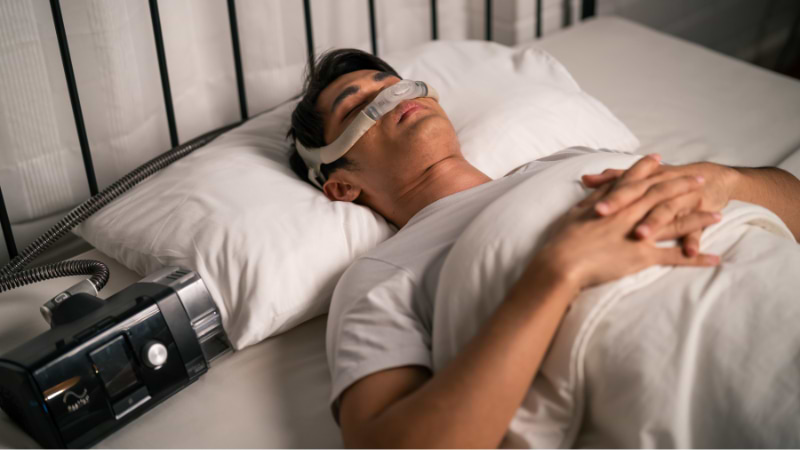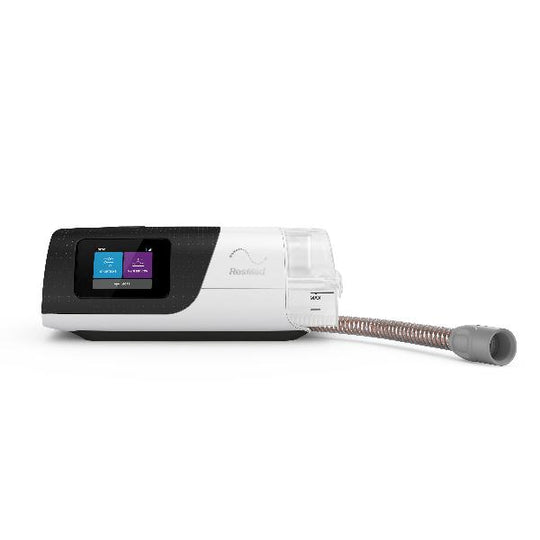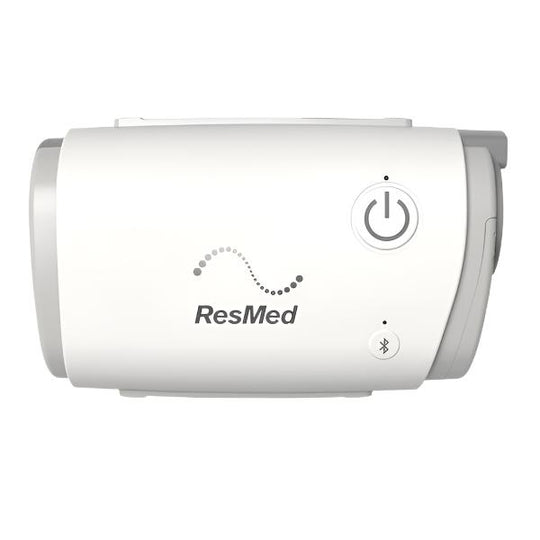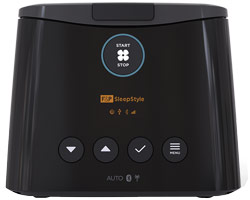
Top 5 Best CPAP Machines (2025 Review)
|
|
Time to read 19 min
|
|
Time to read 19 min
Looking for the best CPAP machines? You're in the right place because in this guide, we'll cover:
There are many guides on CPAP machines, but few are written by sleep professionals who understand the full spectrum of sleep apnea treatment options.
So what is the best CPAP machine? Let's find out.
Table of contents
Below is my summary review of each of the top 5 CPAP machines I reviewed.
| Image | Product | |||
|---|---|---|---|---|
|
OUR TOP PICK

|
OUR TOP PICK |
ResMed AirSense 11 AutoSet
|
|
Check Price |
|
VALUE OPTION

|
VALUE OPTION |
ResMed AirMini AutoSet Travel CPAP
|
|
Check Price |
|
HIGH-END OPTION

|
HIGH-END OPTION |
Fisher & Paykel Sleep Style Auto
|
|
Check Price |
|
CPAP ALTERNATIVE

|
CPAP ALTERNATIVE |
VitalSleep Anti-Snoring Mouthpiece
|
|
Check Price |
|
SEVERE SLEEP APNEA

|
SEVERE SLEEP APNEA |
ResMed AirCurve 10 VAuto BiLevel
|
|
Check Price |
Whether you're new to CPAP therapy or looking to upgrade your current device, it's essential to choose a machine that fits your needs and lifestyle. Below, we’ve rounded up the top CPAP machines of 2025 to help you make an informed decision.
Key Features:
Built-in heated humidifier with climate control
Quiet operation at just 26.6 dB
myAir app connectivity for sleep tracking
SmartStart feature begins therapy when you breathe into the CPAP mask
Why it's our top pick: The ResMed AirSense 11 represents the gold standard in auto CPAP technology. Its AutoSet algorithm is incredibly sophisticated, making micro-adjustments throughout the night based on your breathing patterns and keeping your upper airway open. After researching hundreds of user reviews, I found consistent praise for its comfort and effectiveness in reducing apnea events.
Who it's best for: Anyone with moderate to severe obstructive sleep apnea who wants the most advanced pressure therapy available. Particularly good for new CPAP users who need the machine to adapt as they get comfortable with therapy.
Price range: $800-$1,200
Pros:
Cons:
Key Features:
Ultra-compact, portable CPAP design weighing just 10.6 ounces
Auto-adjusting pressure levels with proven AutoSet algorithm
Smartphone app connectivity for data tracking
FAA approved for airline travel
Waterless humidification with HumidX technology
Why it's our budget pick: While it lacks some premium features, the ResMed AirMini delivers effective CPAP therapy at a fraction of the cost. Based on customer feedback I've researched, users appreciate its reliability and ultra-portability, though some miss having traditional humidification options.
Who it's best for: Budget-conscious users, frequent travelers, or those who prefer minimal features and maximum portability for their sleep apnea treatment.
Price range: $400-$600
Pros:
Significantly more affordable than full-size models
World's smallest travel CPAP machine
Reliable auto CPAP technology from ResMed
Perfect for frequent travelers
Simple, intuitive controls
No need for a heated humidifier tank
Cons:
Requires HumidX cartridges for humidification (ongoing cost)
Limited CPAP mask compatibility
Louder operation than premium models
No traditional water-based humidification system
Key Features:
Why it's worth the premium: The SleepStyle Auto offers the most comfortable CPAP experience available. The heated breathing tube and advanced humidification system address the two biggest complaints I hear about CPAP therapy - cold air and dryness that can disrupt your night's sleep.
Who it's best for: Users who have struggled with CPAP comfort, those living in dry climates, or anyone who wants the most advanced comfort features available for better sleep.
Price range: $1,200-$1,600
Pros:
Cons:
Key Features:
Why it's best for this specific case: For mild to moderate obstructive sleep apnea, oral appliances like VitalSleep can be just as effective as CPAP therapy with much higher compliance rates. Research shows that while CPAP reduces AHI more dramatically, oral appliances achieve similar health outcomes because people actually use them consistently. They work by keeping your airway open through jaw positioning rather than air pressure.
Who it's best for: People with mild to moderate OSA, those who travel frequently, CPAP intolerant patients, or anyone seeking a simple, comfortable alternative to continuous positive airway pressure.
Price range: $60-$120
Pros:
Cons:
Key Features:
Why it's best for this category: BiLevel machines like the AirCurve 10 provide separate pressures for inhalation and exhalation, making breathing more natural and comfortable. This is crucial for severe sleep apnea patients who need higher pressure levels to keep their upper airway open.
Who it's best for: Patients with severe obstructive sleep apnea, those who can't tolerate standard CPAP pressure levels, individuals with central sleep apnea, or patients with complex sleep-disordered breathing requiring specialized sleep apnea treatment.
Price range: $1,500-$2,500
Pros:
Cons:
Choosing the right CPAP machine isn't just about comfort - it's literally about your health and longevity. Obstructive sleep apnea causes you to stop breathing repeatedly throughout the night, sometimes over 100 times per hour in severe cases. This isn't just about snoring; it's about your brain and body being deprived of oxygen while you sleep as your upper airway collapses.
The mechanism is straightforward: CPAP machines deliver continuous positive airway pressure that acts as an "air splint" to keep your airway open. Unlike oral appliances that work by repositioning your jaw, CPAP therapy uses pressurized air to prevent airway collapse entirely. The constant airflow creates just enough air pressure to maintain an open breathing passage throughout your night's sleep.
Here's why the right machine matters: Studies show that even one night without CPAP can lead to excessive daytime sleepiness and morning headaches the next day. But more importantly, untreated OSA significantly increases your risk of cardiovascular disease, stroke, and diabetes. Sleep medicine specialists consider CPAP the gold standard treatment because it's incredibly effective - when people actually use it.
The catch? Compliance. Research indicates that about 25% of patients receiving oral appliances may have no improvements and may even see their sleep apnea worsen. However, CPAP therapy faces its own challenge: adherence rates. Many patients struggle with CPAP mask discomfort, air pressure intolerance, or simply find the medical device too cumbersome.
This is where choosing the right auto CPAP machine becomes crucial. A machine that's too loud, lacks proper humidification causing dry mouth, or doesn't adjust pressure levels to your needs will likely end up collecting dust in your closet. The best CPAP machine is the one you'll actually use every night for effective sleep apnea treatment.
My approach to evaluating CPAP devices comes from decades of experience helping people solve their sleep breathing problems. While I typically recommend oral appliances like VitalSleep for most of my patients with mild to moderate OSA, I recognize that CPAP therapy is essential for those with severe obstructive sleep apnea or specific medical conditions.
Here's my evaluation methodology:
Clinical Effectiveness: I reviewed sleep study data and clinical research on pressure algorithms, focusing on how well each auto CPAP machine reduces apnea-hypopnea index (AHI) and improves oxygen saturation levels while keeping the upper airway open.
Real User Experiences: I analyzed thousands of customer reviews, sleep forums discussions, and patient feedback to understand real-world performance beyond marketing claims. I looked specifically for patterns in complaints about CPAP mask comfort, dry mouth issues, and praise for better sleep quality.
Compliance Factors: Since the best CPAP machine is worthless if you don't use it, I prioritized features that improve adherence: noise levels, CPAP mask comfort, humidification quality to prevent dry mouth, and ease of use for a good night's sleep.
Technical Innovation: I evaluated each machine's auto-adjusting pressure algorithms, data tracking capabilities, and smart features that can improve therapy outcomes. This includes how well they handle different sleep positions and varying pressure needs.
Value Proposition: I considered not just the upfront cost, but the total cost of ownership including replacement parts, ongoing maintenance, warranty coverage, and insurance companies' coverage policies.
Expert Consultation: I spoke with sleep technicians, respiratory therapists, and sleep medicine physicians who work with these CPAP devices daily to understand their clinical preferences and patient outcomes.
You can trust these reviews because they're based on both clinical evidence and real-world experience with sleep apnea patients. I'm not just recommending machines based on specifications - I'm recommending the ones that actually help people achieve better sleep and improve their health through effective continuous positive airway pressure therapy.
This is arguably the most important feature in modern CPAP machines. Auto CPAP machines adjust air pressure throughout the night based on your breathing patterns, ensuring you get the minimum effective pressure at all times. This reduces side effects like dry mouth and improves comfort compared to fixed-pressure machines. The ResMed AutoSet algorithm is particularly sophisticated in this regard.
Dry air from CPAP devices can cause nasal congestion, dry mouth, and throat irritation - leading many people to abandon therapy. Built-in heated humidifiers add moisture to the pressurized air, dramatically improving comfort. Look for models with climate control that prevents condensation in the tubing and ensures optimal airflow.
Modern auto CPAP machines collect detailed data about your sleep patterns, pressure needs, and therapy effectiveness. This information is invaluable for your healthcare provider to optimize your sleep apnea treatment. Smartphone apps make it easy to track your progress and stay motivated with your CPAP therapy.
CPAP machines have gotten much quieter over the years, but noise levels still vary significantly. Look for machines under 30 dB - any louder and you risk disturbing your bed partner or having trouble falling asleep yourself during your night's sleep.
Different machines work better with different CPAP mask styles. Make sure your chosen machine is compatible with the mask type that's most comfortable for you - whether that's nasal pillow masks, full face masks, or nasal masks. Proper mask fit is crucial for maintaining the right air pressure and preventing leaks.
Features like EPR (Expiratory Pressure Relief) or C-Flex reduce air pressure during exhalation, making breathing feel more natural. This can significantly improve comfort, especially for new CPAP users who are adjusting to pressurized air therapy.
A ramp allows the auto CPAP machine to start at a lower pressure and gradually increase to your prescribed pressure levels over 5-45 minutes. This helps you fall asleep more easily before the full air pressure kicks in, making the transition to CPAP therapy smoother.
If you travel frequently, consider portable CPAP machines that are FAA approved and lightweight. Travel CPAP machines like the ResMed AirMini or Transcend Micro offer full therapy in compact packages, though they may have different humidification systems.
CPAP machines are incredibly effective when used consistently for sleep apnea treatment. Clinical studies show that CPAP therapy can reduce the apnea-hypopnea index (AHI) from an average of 32.85 events per hour to 12.93 events per hour - that's about a 60% improvement. This dramatic reduction in breathing interruptions translates to better oxygen levels, improved sleep quality, and significant health benefits.
The effectiveness varies by severity of obstructive sleep apnea. For severe cases, auto CPAP machines can be life-changing, literally preventing hundreds of breathing interruptions per night by keeping the upper airway open with continuous positive airway pressure. Even for moderate OSA, the improvements in daytime alertness and cardiovascular health are substantial when patients achieve better sleep.
However, effectiveness depends entirely on compliance. The most sophisticated auto CPAP machine won't help if it's sitting unused in your bedroom. Studies show that even one night without CPAP can lead to excessive daytime sleepiness and morning headaches the next day.
This is where the comparison to oral appliances becomes interesting. While CPAP therapy may be more effective at reducing AHI numbers, oral appliances like VitalSleep often achieve similar real-world health outcomes because people actually use them consistently. Research shows that both CPAP and oral appliances provide similar reductions in blood pressure and cardiovascular risk - the key is finding the sleep apnea treatment you'll stick with long-term.
For patients who struggle with traditional CPAP therapy, BiLevel machines (BiPAP) like the ResMed AirCurve series offer different pressure levels for inhalation and exhalation, which can improve comfort and compliance while still providing effective continuous positive airway pressure.
I've spent considerable time researching customer experiences across sleep forums, product reviews, and patient feedback to understand how CPAP devices perform in the real world versus clinical settings.
CPAP Mask Issues: The most common complaints center around mask fit and comfort. Users report problems with air leaks, red marks from headgear, and difficulty finding a CPAP mask that stays in place all night. Full face mask users often struggle more with leaks than those using nasal pillow masks.
Claustrophobia and Anxiety: Many users, especially those new to CPAP therapy, struggle with feeling trapped or anxious with the mask on. This is particularly challenging for people who already have anxiety disorders and find the pressurized air overwhelming initially.
Maintenance Requirements: Users frequently complain about the ongoing maintenance - cleaning the machine, replacing filters, dealing with heated humidifier maintenance, and equipment failures. The complexity of CPAP devices can be overwhelming for some patients.
Travel Challenges: Despite portable options like travel CPAP machines, traveling with equipment remains a significant complaint. Even with FAA approval, airport security, finding power outlets, and packing all the components adds stress to travel. Many users invest in dedicated travel CPAP machines like the Transcend Micro for this reason.
Insurance and Cost Issues: Many users express frustration with insurance companies' requirements, equipment rental programs, and the high cost of replacement parts and CPAP masks. Warranty coverage varies significantly between medical device manufacturers.
Side Effects: Common complaints include dry mouth despite humidification, nasal congestion, bloating from swallowing air during therapy, and skin irritation from CPAP mask contact. Some users also report difficulty with different sleep positions while wearing headgear.
What's interesting is that many of these issues don't exist with oral appliances. This is why I often recommend devices like VitalSleep for patients with mild to moderate obstructive sleep apnea - they offer good effectiveness with much higher compliance rates and no need for pressurized air or complex equipment.
The sleep apnea treatment landscape offers several options, each with distinct advantages and limitations. Understanding these differences is crucial for choosing the right approach for your specific OSA condition.
CPAP vs. Oral Appliances: Auto CPAP machines are more effective at reducing AHI numbers through continuous positive airway pressure, but oral appliances often achieve similar health outcomes due to higher compliance rates. For example, while CPAP therapy might reduce your AHI from 30 to 5 events per hour, an oral appliance might only reduce it to 12 - but if you use the oral appliance every night and only use your auto CPAP machine three nights per week, the oral appliance provides better real-world results for your sleep apnea treatment.
Oral appliances like VitalSleep are silent, require no electricity or pressurized air, and are ideal for travel without FAA restrictions. However, they're not suitable for severe obstructive sleep apnea or patients with certain dental conditions.
Auto CPAP vs. BiLevel (BiPAP) Machines: Standard CPAP devices provide constant air pressure, while BiLevel machines like the ResMed AirCurve series offer different pressures for inhalation and exhalation. This can be more comfortable for patients who struggle with higher pressure levels or have both obstructive and central sleep apnea. BiLevel therapy is often prescribed when standard CPAP therapy isn't well-tolerated.
CPAP vs. Surgery: Surgical options like UPPP (uvulopalatopharyngoplasty) can be effective but carry significant risks and aren't always successful. CPAP therapy is non-invasive and reversible, making it a safer first-line sleep apnea treatment. Surgery is typically reserved for cases where CPAP and oral appliances have failed to provide adequate airway opening.
Portable vs. Full-Size CPAP Machines: Travel CPAP machines like the ResMed AirMini or Transcend Micro offer convenience and portability with FAA approval, but may have limitations in humidification options and pressure range. Full-size machines like the ResMed AirSense 11 provide comprehensive features including heated humidifiers and advanced algorithms but are less convenient for travel.
CPAP vs. Positional Therapy: For patients whose obstructive sleep apnea is primarily position-dependent (worse when sleeping on their back), positional therapy devices can be effective. However, these only work for a subset of patients and aren't suitable for severe OSA requiring continuous positive airway pressure.
The key is matching the treatment to the patient and working with your healthcare provider. For severe sleep apnea (AHI >30), auto CPAP machines are typically the most appropriate first-line treatment according to sleep medicine guidelines. For mild to moderate cases, oral appliances may offer better long-term compliance and similar health outcomes.
Most people need 2-4 weeks to fully adjust to CPAP therapy and achieve consistent better sleep. The first few nights with pressurized air can be challenging, but gradual introduction using the ramp feature and starting with short periods of wear while awake can help. Working with your healthcare provider to find the right CPAP mask and pressure settings is crucial during this adjustment period.
Yes, CPAP devices are considered medical equipment by the TSA and don't count toward your carry-on limit. They're FAA approved for airline travel. Most airlines provide power outlets or USB ports for overnight flights. Portable CPAP machines like the ResMed AirMini or Transcend Micro are specifically designed for travel and offer full therapy in compact packages.
Filters should be replaced monthly, CPAP masks every 3-6 months, and tubing every 6 months. The heated humidifier chamber needs regular cleaning and occasional replacement. The auto CPAP machine itself typically lasts 5-7 years with proper maintenance. Insurance companies often cover these replacement costs, but check your specific plan requirements and warranty coverage.
Most CPAP machines don't have backup batteries, so power outages will interrupt your sleep apnea treatment. Battery packs are available for purchase, or you might consider a portable unit with battery capability like certain travel CPAP machines for emergencies. This is especially important for patients with severe obstructive sleep apnea.
Dry mouth is common and usually indicates mouth breathing or air leaks around your CPAP mask. Adding a heated humidifier often solves this problem by adding moisture to the pressurized air. If you're a chronic mouth breather, a full face mask might be more appropriate than nasal pillow masks for your CPAP therapy.
Properly fitted and calibrated CPAP devices don't worsen obstructive sleep apnea. However, incorrect pressure settings or poor CPAP mask fit can reduce effectiveness and disrupt your night's sleep. Regular follow-ups with your sleep medicine specialist ensure optimal pressure levels and proper airway opening.
Yes, OSA returns immediately when you don't use continuous positive airway pressure. Even one night off can result in poor sleep quality, daytime sleepiness, and return of apnea events. Consistency is crucial for maintaining the health benefits of your sleep apnea treatment.
For mild to moderate obstructive sleep apnea, oral appliances like VitalSleep are excellent alternatives with high success rates and no need for pressurized air. BiLevel machines (BiPAP) like the ResMed AirCurve series offer different inhalation and exhalation pressures for those who can't tolerate standard auto CPAP machines. ASV devices or surgical options may be considered for severe cases where standard CPAP therapy fails.
Your sleep medicine physician will determine the correct air pressure through a sleep study or by reviewing data from your auto CPAP machine. Signs of incorrect pressure levels include continued daytime sleepiness, frequent awakenings, CPAP mask leaks, or failure to keep your upper airway open effectively during different sleep positions.
Most insurance plans cover CPAP devices after a sleep study confirms obstructive sleep apnea. However, many require a "compliance period" where you must use the machine a minimum number of hours per night to continue coverage. This is typically 4+ hours per night for 70% of nights in a 30-day period. Check with your insurance provider for specific requirements regarding medical device coverage and warranty terms.
Remember, the best CPAP machine is the one you'll use consistently every night for effective sleep apnea treatment. While auto CPAP machines are highly effective for severe OSA, don't overlook alternatives like VitalSleep for mild to moderate cases - sometimes the simpler solution that doesn't require pressurized air or complex headgear is the most effective long-term approach for achieving better sleep.




